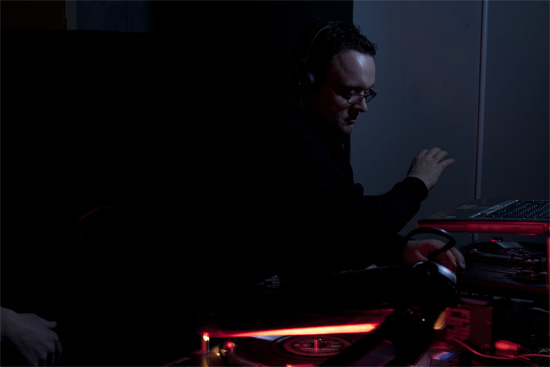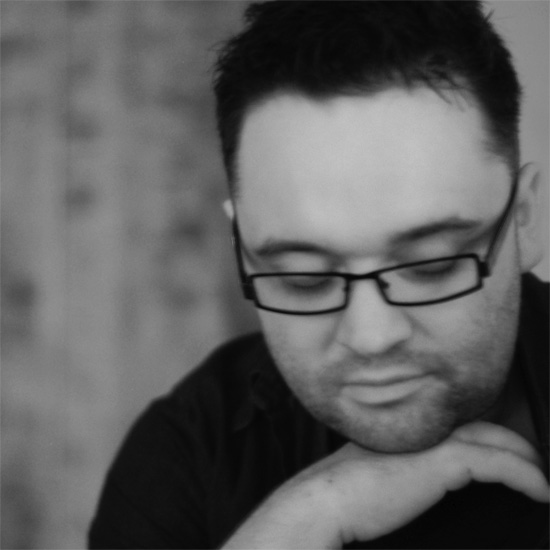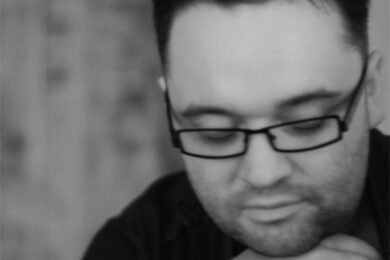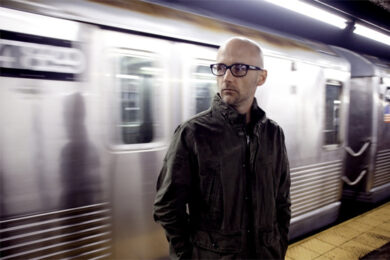It’s probably unfair to describe Ruaridh Law, the Glasgow-based musician who works under the alias TVO, as underrated, since most people aware of his work hold it in very high regard. But it’s probably safe to state that he’s one of the UK’s more unfairly overlooked electronic artists, someone who’s been quietly working away at his craft for years, comparatively beneath the radar. Since 2005, Law’s solo output has explored a bewildering array of disciplines, from the crystalline club tracks of his early work (as both The Village Orchestra and TVO), through longform ambient pieces, guitar explorations, electronic drone, field recordings and, with last year’s marvelous Red Night album, a rain-spattered suite of depth-charged techno, powered by sludgy kickdrums that throb upward through the mix like a heartbeat.
In 2010 Law, alongside friends Dave Fyans (aka Erstlaub) and David Donnelly (aka Production Unit), set up his own label, Broken20, whose stated aim was to ‘release music rooted in a particular aesthetic … concerned with decay, erosion, entropy, mistakes and errors, line noise and tape hiss, hum and buzz’. They’ve done an excellent job of fulfilling that brief in the time period since, care of stripped back techno from Production Unit and Isodyne, two albums of static-addled electronic drone from Erstlaub, several of TVO’s own releases and more.
The label’s first release was one of its most distinctive, another from Law himself called We Can Remember It For You Wholesale (named after the Philip K. Dick story that inspired the film Total Recall). A strikingly moving hour-long piece taking in long periods of suspended ambience, choral song, blasts of corrosive electronic interference and human voices discussing themes of memory, it was a recording of a special performance commissioned by Manchester’s Future Everything festival the same year. "All they gave me was the idea of memory cards versus human memory," recalls Law. "The fact that one degrades over time, and one is practically invulnerable." So he decided to start interviewing his parents, friends and colleagues about their feelings and ideas around memory. "Without realising, when I listened through all the recordings, 90% of them were my parents talking about their memories. I thought, well, this has turned from me interviewing the ‘public’, general people, into something about my parents specifically, which was really nice."
Red Night, released last year via Broken20 cassette sub-label Broken60, marked a turning point for Law’s music. Conceptually based around William Burroughs’ novel Cities Of The Red Night, it found him shifting towards a noisier and more unpredictable way of working, based largely around bits of sound-making hardware acquired at random.
This week, he releases its sequel, Red Night Variations, which takes the original as a jumping-off point from which to explore further, featuring one cassette side of Law’s own re-interpretations of his tracks, and another side of remixes by Covered In Sand, aka rising techno artist Shifted. It might just be the best thing both Law and Broken20 have been involved in to date, with Law’s tracks occupying a sweet spot between the sludgy murk of the original Red Night, the percussive drive of his club music, and a newfound urgency that touches on the dread bass pressure of Shackleton and Raime, Kassem Mosse’s gradually unspooling house grooves and, on highlight ‘Super 8 In Glasgow Tenement’, the drizzle-soaked moorland electronics of The Haxan Cloak.
This Friday, 15th March, Broken20 are hosting a label night in collaboration with London promoters Colony. Taking place at Stoke Newington’s Waiting Room, it features label heads TVO, Erstlaub and Production Unit, as well as Spatial and Szare, who will both be releasing records through Broken20 this year. (For more information and tickets, click here). The Quietus caught up with Law on the phone from his home in Glasgow to discuss Red Night and its sequel, and the importance of hearing the human behind the machine.
I wanted to start by asking about Red Night Variations. Why the decision to expand on the original? Was there a particular pathway that seemed logical to follow away from the original into something new?
Ruaridh Law: I’m a terrible person for getting the concept first and then working [onward] through that. In fact, that’s what I do every single time. I don’t think I’ve ever released an album apart from my very first one where I’ve not started with the idea and kind of worked through to it. The reason why Red Night came about in the first place [was that] I’d done this album called Amid The Blaze Of Noon, which was one of the last albums on [now sadly defunct UK label] Highpoint Lowlife, and it had taken maybe six months to finish. I’d had loads and loads of bits that I was trying to splice together, I was doing masses of post production on it, lots of really anal retentive studio stuff, really tedious computer editing. I ended up getting really caught up in it. And so I thought, the next thing I do needs to be really really stripped down. I wanted to record it in four or five days, maybe hardware, just set it up and bang bang bang, get it out that way. And that’s exactly what I did.
It was more or less exactly a year ago, I think, it was end of December or start of January 2012, and I’d bought a couple of wee extra bits and pieces of hardware, and just set everything up, and over two nights, I literally just sort of improvised, messing about, and spliced them together, and that was it. I put on for inspiration this DVD of William Burroughs short films in the background – I’m really into Burroughs, I’m kind of a super fan boy I guess – so I thought, you know, this is quite good, it’s got cut-up elements to it, and a really dark oppressive vibe, a bit like Cities Of The Red Night, which is one of my favourite books.
So then I thought – unfortunately, because it’s me – I can’t just do the one album. Because [the book] Red Night is the first in a trilogy, I need to do two more [albums], with one based around each book. And then I thought well, that’s fine, but I don’t want to go through this whole process again, and I’ve actually got loads of ideas still around Red Night, because there were lots of unfinished ideas with it.
[So for a couple of performances at around the same time – one at Brighton’s Outer Church, and one in a tenement flat in Glasgow organised by Paul Purgas] I wanted to do something really different, but I wanted to feed out of what I’d just finished doing. I put together a performance set-up in Max/MSP, and because Red Night had some samples from some old 1950s Haitian voodoo records in it, the whole little patch was based around voodoo and voodoo sigils and that kind of thing. I had Maya Deren’s Divine Horsemen, which is a 1940s/50s documentary about Haitian voodoo, it’s highly recommended, it focuses heavily on all the symbolism and magical aspects of it. That was running in the background on the computer, and it playing was generating sound based on what was showing on the screen at the time, so I left all this running and kind of performed over the top of it. I enjoyed it so much that I thought, I need to use this for recording, so I’ll definitely use it to do variations. Instead of it being all hardware, as before, I’m going to heavily process it and take the hardware bits and bury them underneath some more software-heavy kind of stuff, but still try and base it around what I was doing live.

That sounds like an interesting and pretty in-depth way to work.
RL: I guess the reason I’m never going to be a techno musician is because you read the tweets sometimes from these guys, and it’s like ‘Went into the studio, knocked out four tracks, getting them mastered tomorrow, out on vinyl next week’. That’s just not, unfortunately, how I work. [laughs] I get an idea and I need to see the idea all the way through. I try not to be massively pretentious about it and say "inspiration strikes, and then you just have to explore it"… I just get an idea and think, that’s what I have to do. It becomes, not an obsession, but really unshakeable. Deviating from the idea kind of defeats the purpose of doing it. The idea’s the important thing.
I was listening to the original Red Night on my way back from work today [in late January], and it seemed to match the feeling of the environment rather well – frosty, dark, a bit bleak and unnerving, but beautiful.
RL: The book is partly set on a tropical island – I don’t know exactly where it’s based around, I imagine it must be in the Caribbean somewhere because it’s tied up with piracy and that sort of thing – but it was recorded on a really cold day. In fact, it was incredibly stormy a year ago in Glasgow at the point it was being recorded, so you couldn’t get further away from that kind of vibe when it was getting made, and it’s full of hiss and what sounds to me a bit like fog and rain – which is definitely more Scotland than it is Trinidad, I would say! [laughs]
I’d like to read it. I like a lot of Burroughs’ stuff I’ve read, and reading the blurb for it, it sounded like it would tick a lot of boxes for me.
RL: Burroughs’ really heavily cut-up stuff is not the kind of stuff you’re going to sit and just read for light relief. I really love that too, but it’s got its own time and place, and his really straight stuff is also good, but I sometimes find it a little too matter of fact, a little too dry. The great thing about all three books in the trilogy is that they are the perfect blend of the two. There’s really quite dramatic cut-up at times in it – so there’s elements that don’t make sense, they don’t make normal narrative sense – but then they do have a theme or a story. Red Night definitely has a narrative runing through it.
It’s embarrassing to say it, [but] quite a lot of stuff that I’ve done has literary references or literary elements in it, and it’s not to make myself sound like I’m smart. It’s just when I was 19 or 20 or 21 when I was first deciding or figuring out the stuff I was going to be doing, this was the stuff I was reading, and it had a really profound effect. [Cities Of The] Red Night was literally like a key in my brain turning, and thinking, this is just tapping in absolutely with what I’m thinking about just now.
Red Night in particular seemed to crystallise a move in your music towards a much more degraded, hardware-based sound. What precipitated that move?
RL: A couple of things, I would say. One of them is that I started to listen to noisier music. It’s quite a simple thing, I’m quite open about the fact that I’m the sum of my influences – be it music or other influences – but I did start to listen to more music that had a bit more grit and crackle to it. I’ve always been into noisier music, I really liked the early Mego records and things that had that digital noise to them, but I guess the popularity and frequency of that stuff definitely waned, and there was a move in culture towards more analogue noise sounding stuff.
People talk about techno as an example of something being soulless and emotionless, [but] for me it doesn’t matter what sort of music you’re making, as long as you can detect the presence of a beating human heart behind it, then that’s a success. And you can have harsh noise, but you can still hear playfulness, or you can hear somebody manipulating it in a way that lets you know there’s somebody in there, that you’re getting something of the person. And definitely someone like Philip Jeck, who is [exaggerating] the vinyl crackle… Even though it doesn’t sound like its source material, you’re definitely getting his human spirit in there somewhere.
The first two albums I did were very in the box, they were written on laptops, they might have had a bit of studio trickery afterwards but that’s it. I’m fine with them, but listening back to them, they were lacking a bit of human spirit. Because of the way I record things – I don’t like to automate things, I like to tweak everything, even on the laptop, by hand – that adds a human touch to it. But I think I just started to feel I wanted to get a bit more of a voice. I’m not some sort of gear obsessive, but [hardware] is an immediately easy way to make sure you’re getting a bit more grit under the nails of it, or to get a bit more hands on about it. … Instead of buying fancy £3000 synths, I went and bought circuit bent [things]. Well, I’ve got a circuit bent sleep machine at the moment – the sort of thing that Americans use to get themselves off to sleep, white noise and trickling water – the circuit bent version of that! And weird hand held synths that guys sell on the internet for 90 quid, or really old delay units that don’t work properly. That kind of thing. So there is still a sense of unpredictability and "oh fuck, is this even going to switch on when I plug it in?", type thing.
Limiting yourself creatively [can be] really good, because you can end up going in directions you don’t expect. For Red Night, doing it hardware-only made me completely reconsider how to do things. I didn’t even have a drum machine, all my drums [previously] were written on a laptop, so I ended up feeding a sync out from an old synth which made this really big click, which when I turned the bass up full on the desk made it sound like a kickdrum. That’s the kind of thing, so you do end up being more creative.
That’s why on the record you only have this really oppressive, thick, syrupy kickdrum, rather than anything else.
RL: Yeah, cheating kickdrums all the way, unfortunately! There’s some hi-hats from an old modular, but [that’s it]. Because a sync on hardware is just a pulse, that’s all it is, it’s just taking the pulse and making it musical, I guess. But the reason why I got into making this sort of music is because when you’re on a computer you can make any sound you want in the world. So I like being limited, but at the same time, with doing the Variations versions [using software], it’s to say "well, that’s fine, I’ve been limited and now I can do whatever I want with them". So I also like the freedom that working off a laptop gives you. There’s got to be a bit of room for both I think.
Finally I wanted to ask about Broken20. The label’s been doing increasingly well over the last year or two, it seems – how do you think it’s developed over the time you’ve been doing it, and are you happy with the how it’s gone so far?
RL: My biggest fear was that we would put out a couple of releases and nobody would care. I don’t have the greatest attention span, and if things aren’t going the way that I want, then I’ll just move onto something else. We’re now at ten Broken20 releases and we’re about to do the third Broken60 release, and if you’d asked me when we first started up that we’d be close to 15 releases, I’d have laughed. We just wanted to put out music which wasn’t getting put out. That didn’t mean we were going to go for stuff that was obscure, but it just meant that if people were sending us stuff and it was good, [putting stuff out digitally] means we don’t have to justify [it] to a distributor. That’s the thing about digital releases: as long as you have faith in it, and we have faith in everything we put out, then people should get my fervour about it. I think they do, because each release we’ve done has done better than the one preceding it.
And we’re at the stage where people whose music I respect are approaching us and saying "We would really like to do something, we have this great idea we couldn’t put out anywhere else" – that’s quite an important thing – "no other label will touch X, Y, or Z, would you do it?" And the answer is if we like it, then somebody else must like it – because I don’t have massively esoteric taste that nobody else has got – and we’ll put it out.
TVO plays at the Waiting Room, London, this Friday 15th March, alongside Erstlaub, Production Unit, Szare, Spatial, Tengui, Colony DJs and Quietus DJs. For info & tickets click here. For more on Broken20 and to listen and buy their releases, head across to the Broken20 site and Bandcamp shop.
To accompany the feature, Ruaridh has offered to give away an album of his work under an earlier pseudonym, Accrual, entitled Kirkville Blue, a full-length of processed guitar. You can download it by clicking here.
Says Ruaridh: "Kirkville Blue was one of two albums as Accrual that I recorded with my cousin Alasdair. He improvised guitar, both electric and semi-acoustic, into a live processing setup I had in the Audiomulch software and we just pretty much recorded the output unedited.
"The other [Accrual] album, Cheophiori, is being reissued by the excellent Moving Furniture records from the Netherlands later this year, and so I thought it would be nice to give away Kirkville Blue as a companion piece. It originally came out on Unlabel’s Series 52 CD-R series, and is a collection of short linked pieces around a centrepiece improvisation over an original track from Erstlaub, who at that point was just a friend, but now of course is one of the lynchpins of my Broken20 label."




